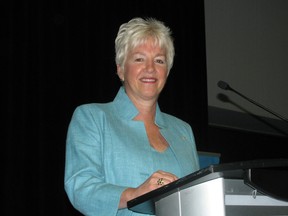Annette Verschuren resigned from the board of directors of Sustainable Development Technology Canada last year after she became the subject of an ethics investigation

Canadian businesswoman Annette Verschuren resigned as president of the board of directors of Sustainable Development Technology Canada (SDTC) late last year when it was announced that she was the subject of an ethics investigation.
On Wednesday, ethics commissioner Konrad von Finckenstein found that Verschuren “failed to comply” with some provisions of the Conflict of Interest Act, but dismissed another complaint that she used her position to try to influence other board members.
“When a conflict of interest arises, recusal — not abstention — is the proper way to manage it,” he said. “Instead of abstaining from decisions in which she had private interests, Ms. Verschuren should have recused herself. Recusal means leaving the room when the decision is being made. Her actions fell short of what the Conflict of Interest Act requires.”
“It was clear that Ms. Verschuren took what she believed to be the right steps to manage her conflicts of interest. However, she did not meet the Act’s requirements,” he added.
The commissioner also dismissed allegations of conflict of interest concerning Guy Ouimet, a director of SDTC, because his ownership in a company that benefitted from the organization’s COVID-19 emergency relief payments was minimal.
“This is the second investigation in a few short months that criticized the waste and corruption at Trudeau’s billion dollar Green Slush Fund,” said Conservative ethics critic Michael Barrett, who instigated the reports on Verschuren and Ouimet’s dealings.
Verschuren co-founded the craft chain Michaels Canada and served as CEO of Home Depot Canada before venturing into the world of green technologies.
After she was appointed to SDTC in 2019, she continued to serve on the board of two not-for-profit corporations, the Verschuren Centre for Sustainability in Energy and the Environment, which she founded, and the MaRS Discovery District. Both entities are business accelerators that give developing companies investments and other supports.
She also remained chair, CEO and majority shareholder of NRStor Inc., a company she founded which builds, owns and operates energy storage projects.
Two types of SDTC funding decisions were at the heart of the ethics commissioner’s probe relating to Verschuren: the first was one-time contributions of $50,000 to $100,000 to companies that were nominated by or associated with the Verschuren Centre or MaRS and the second was related to the approval of COVID-19 emergency relief funding for NRStor.
The minutes of the SDTC board meetings reviewed by the commissioner showed some “inconsistencies” in how Verschuren dealt with conflicts of interest. While she sometimes declared a conflict and abstained from voting on projects, that was not always the case.
“Because of her roles as a director of MaRS, the Verschuren Centre and SDTC, Ms. Verschuren improperly furthered the interests of the beneficiaries of SDTC funding to companies associated with those accelerators,” wrote von Finckenstein.
He noted that the SDTC board did not always follow its standard practice of reviewing and approving funding applications individually, which would have allowed directors with a conflict of interest to recuse themselves from certain parts of meetings.
The commissioner also determined that she “furthered her private interests” in NRStor by participating in two decisions on COVID-19 emergency relief funding in March 2020 and 2021, and that she did it “knowing that NRStor would benefit from the funding.”
But that was the case for all board members. He wrote that given the “exceptional circumstances” of the pandemic, having followed “incorrect legal advice,” directors did not declare their conflicts prior to the meetings and no recusals were made.
The commissioner, however, concluded that Verschuren did not use her position as chairperson to influence the board’s decisions on emergency funding.
He wrote that the evidence showed it was not her idea to award those payments to existing qualified projects nor was she involved in determining the eligibility criteria or the proportion of funds to be disbursed.
“Beyond participating in the discussions on SDTC management’s proposals and moving the motions at the meetings, there was no evidence that she attempted to influence the decision of her colleagues,” wrote von Finckenstein.
While he puts much of the blame on Verschuren, he said that her failure to comply with conflict of interest laws was a result of organizational malpractice and bad advice.
“It is unfortunate that a lack of consistency in decision-making processes at SDTC, coupled with incorrect legal advice, caused Ms. Verschuren to deviate from that standard practice and thus led her to contravene the Act.”
National Post
[email protected]
Our website is the place for the latest breaking news, exclusive scoops, longreads and provocative commentary. Please bookmark nationalpost.com and sign up for our newsletters here.